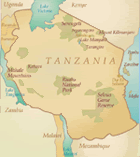Invasion of the Body Snatchers
Over the years I’ve noticed that illness in Africa just catches up with you. Unlike in the States, where you might notice a stuffy nose or a wee bit of exhaustion a day or two before you become outright sick, in Africa there is no preamble. You are healthy one second, sick the next.
I am on my fourth cold since arriving here. This one didn’t come from the kids, and the kids don’t seem to be getting it. It is just my personal burden for the week. It is, of course, better this way, because when the kids get sick I’m obviously burdened, too. But I’m sick of being sick. And sick of getting sick without a good indication that I’m about to be sick. You know me, I’m a planner. If I’m going to be sick I want to schedule for it.
Nobody Likes Me. Everybody Hates Me, I’m Gonna Eat Some Worms…
Two weeks ago the kids and I had a very lovely Sunday evening at Barbeque Village, a local restaurant that features a kid’s play area and very nice Indian food. As Jaden and Rowan ran around in the sand with about 10 other kids belonging to people we know, I sat and enjoyed an interesting conversation and great palak paneer. There was enough food left over at the end of the night to bring home a doggy bag.
But it turns out that isn’t the only thing we brought home.
Fast forward 10 days. Rowan comes into my room in the middle of the night saying that her foot hurts. She is restless and keeps rubbing her feet together. In the morning, I take off her socks (yes, because the air conditioner is cold the kids sleep with socks on in tropical Africa) and find four red streaks, slightly raised like blisters about 2 inches long and thin on the skin on the bottom of her feet. Rowan tells me she stepped on a rock. I think, well, it looks kind of unusual for a scratch, but I put some Neosporin and an Elmo Band Aid on it and send her out to play.
That night, I look at her feet again. The marks had moved up and around the top of her foot – making about an inch of progress. There were at least 3 more as well… one wrapped around her big toe and two on her other foot.
Oh shit, I thought. Something's alive!
In the morning she had even more… and they were clearly moving during the night. Between the top layers of her skin something was alive. And as a bonus prize, Jaden had one, too. And now Rowan had one on her hand!
We were at the doctor’s office when they opened the door in the morning.
“Ah… zeee veerms,” said Dr. Pierre. “Zey are noot uncoomen ere.”
Worms?
Yes worms. Hookwooms.
Not uncommon? Somehow I didn’t get the memo.
Dr. Pierre showed me a French textbook on Parasitology. These hookworms live in dogs intestines. When dogs poo (shit, crap, whatever) in a wet and sandy environment the hookworm eggs develop in the sand. When humans step on them, they bury into their feet, 10 to 14 days later larva are born, and they crawl around looking for food. Lucky for us humans, we are not their natural host. They spend 4 – 8 weeks wondering around aimlessly under the skin and eventually die and get absorbed by the body. In the meantime, they itch like hell. You can’t cut them out. You can encourage them to die more quickly by using a special cold spray (like the one they use to burn off warts) and an anti-parasite cream.
It’s disgusting. But like Dr. Pierre said, “noot uncoomen”. In fact, he told me, they automatically de-worm fall kids for intestinal worms (using the same anti-parasite cream as an oral medicine) once a year. They don’t test for them. They just assume that all kids have them and treat them presumptively. Lovely.
I went home that morning and, putting my epidemiology training to work for the first time since my public health comprehensive exams, began the painstaking analysis of where Rowan and Jaden could have picked this up. We hadn’t been to the beach during the period in question. The kids play in a sandpit at school, but then other kids would have had this (I checked with their teacher), and I imagine they could have gotten it by walking on the road in front of our house barefoot… but they almost never do that.
And then I realized, ah ha, they I got it at Barbeque Village.
But there were so many kids there. I checked with everyone, and none of their kids had hookworms. Humm…
Later that night, however, I found the smoking gun. I was uploading photos and found pictures I took on that fateful night. All the other kids are wearing shoes. Jaden is wearing socks. Rowan is barefoot!
So much for preserving their shoes…
This was our first tropical illness. A right of passage, I suppose.
But I can guarantee you one thing. There will be no more palak paneer at Barbeque Village for the Mahlers.
No more worms.





 Jaden and Rowan
Jaden and Rowan






